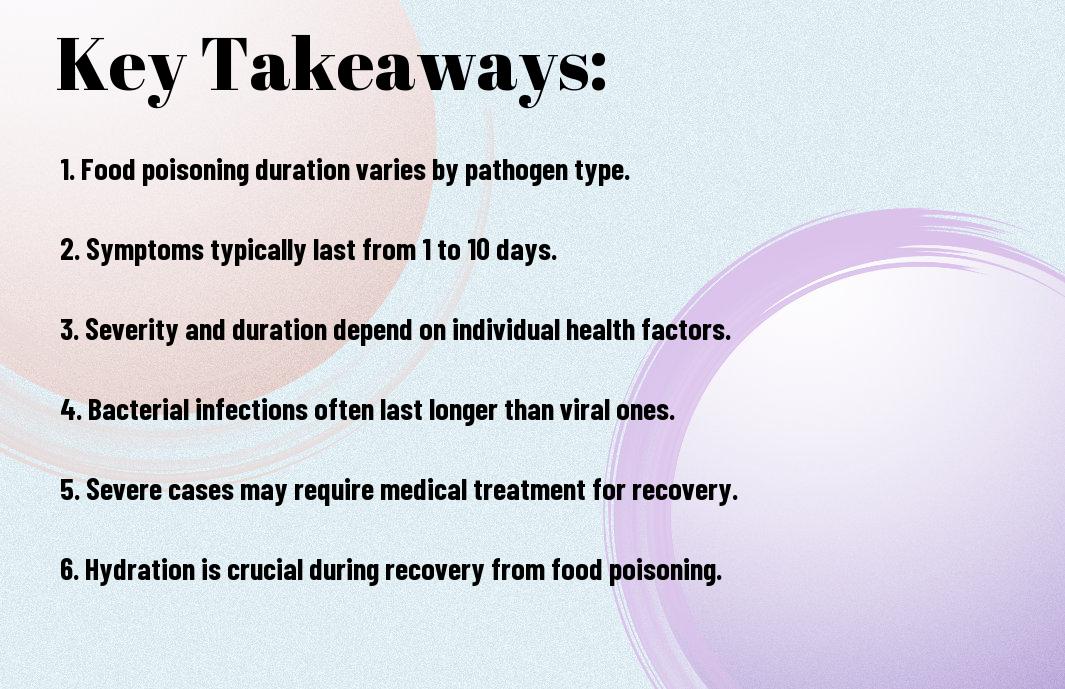With food poisoning affecting millions each year, it’s crucial for you to understand how long its symptoms may persist. Symptoms can vary based on the type of pathogen involved, but you might experience abdominal cramps, nausea, and diarrhea that can last anywhere from a few hours to several days. Knowing what to expect can help you manage your symptoms effectively and seek medical advice when necessary. This blog post will guide you through the typical duration of food poisoning, factors that influence its length, and when it’s time to consult a healthcare professional.

Key Takeaways:
- Duration Varies: The length of food poisoning can range from 1 to several days, depending on the type of pathogen involved.
- Common Symptoms: Symptoms such as nausea, vomiting, diarrhea, and abdominal cramps typically last for a few days, but may persist longer in some cases.
- Seek Medical Attention: If symptoms are severe or last longer than a few days, it is important to seek medical attention to prevent complications.
Understanding Food Poisoning
To grasp the impact of food poisoning, it’s vital to understand what it is and how it occurs. Food poisoning is an illness caused by consuming contaminated food or beverages. The contaminants can include bacteria, viruses, parasites, or toxins, which can lead to various symptoms and health issues in affected individuals.
Definition of Food Poisoning
One of the most common health issues people face is food poisoning, which occurs when you ingest harmful pathogens or toxins present in contaminated food or drinks. Symptoms usually arise within hours or days after exposure and can often be severe.
Common Causes
To effectively prevent food poisoning, it’s vital to know its common causes. The most frequent culprits include bacteria like Salmonella, E. coli, and Listeria, as well as viruses such as norovirus. Cross-contamination, improper cooking, and inadequate food storage can increase the risk of exposure.
It’s important to note that food poisoning can arise from various sources, including improperly handled raw meats, unwashed fruits and vegetables, and contaminated water. Even seemingly harmless foods, like dairy products that are past their expiration date, can harbor harmful bacteria. By understanding these common causes, you can take proactive steps to mitigate your risk of food poisoning in your daily life.
Duration of Food Poisoning Symptoms
Some food poisoning cases can resolve on their own, while others may linger for several days. Understanding the typical duration of symptoms associated with various pathogens can help you gauge the severity of your situation and when to seek medical attention.
Typical Duration for Various Pathogens
Any different types of pathogens can cause food poisoning, and the duration of symptoms may vary significantly. For instance, symptoms from bacterial infections like Salmonella may last between 4 to 7 days, while those from viruses like Norovirus can resolve within 1 to 3 days. In contrast, parasites may cause symptoms lasting for weeks if not treated appropriately.
Factors Influencing the Duration
For your recovery from food poisoning, several factors play a crucial role in influencing how long your symptoms last. These include the type of pathogen responsible, your overall health, the amount of contaminated food consumed, and whether you have any pre-existing conditions:
- Type of pathogen involved
- Your immune system’s strength
- Hydration levels
- Underlying health issues
- Timeliness of treatment
Knowing these factors can help you manage your symptoms more effectively and speed up recovery.
Duration can also be affected by how your body reacts to the infection and how well you care for yourself during this period. Easing your symptoms and understanding your body’s needs can make a significant difference in your recovery timeline:
- Staying hydrated
- Easting bland foods
- Getting plenty of rest
- Seeking medical attention when necessary
Knowing the signs of complications will help you decide when to consult healthcare professionals, ensuring your recovery is optimal and swift.
Symptoms and Their Management
All food poisoning can lead to a variety of uncomfortable symptoms, impacting your daily life. To understand how to alleviate these symptoms, you can refer to resources such as How Long Food Poisoning Lasts and What To Do About It.
Common Symptoms of Food Poisoning
The symptoms of food poisoning can vary widely but typically include nausea, vomiting, diarrhea, abdominal cramps, and fever. These symptoms can onset within hours of consuming contaminated food or may take days to appear, depending on the type of bacteria or virus involved.
When to Seek Medical Attention
Management of food poisoning can usually be done at home; however, there are specific circumstances when seeking medical attention is crucial. If you experience severe symptoms such as high fever, prolonged vomiting, or signs of dehydration, you should consult a healthcare professional.
Seek medical attention immediately if you notice symptoms such as blood in your stool, a fever over 101.5°F (38.6°C), or if you are unable to keep fluids down. Prompt medical care can help prevent further complications and ensure appropriate treatment for your condition.

To wrap up
Upon reflecting, it’s crucial to understand that the duration of food poisoning can vary significantly based on the type of contaminant and your individual health. Generally, symptoms may last anywhere from a few hours to several days, but they should subside after your body eliminates the toxins. If you experience severe symptoms or if they persist beyond a few days, it’s crucial to consult a healthcare professional. You can learn more about the Symptoms of Food Poisoning | Food Safety to better recognize the signs and seek appropriate care.
FAQ
Q: How long does food poisoning typically last?
A: The duration of food poisoning varies based on the causative agent. Generally, symptoms can last from a few hours to several days. Most mild cases resolve within 1 to 3 days, while more severe cases, especially those caused by bacteria like Salmonella or E. coli, can persist for up to a week or more.
Q: What factors influence the duration of food poisoning symptoms?
A: Several factors can influence how long food poisoning lasts, including the type of contaminant (bacteria, virus, or toxin), the individual’s overall health, age, immune system strength, and the amount of contaminated food consumed. Each of these can substantially affect recovery time.
Q: Can I still be contagious after my food poisoning symptoms have stopped?
A: Yes, depending on the pathogen responsible for the food poisoning, individuals can still be contagious after symptoms resolve. For example, norovirus can remain in the stool for several days after symptoms have cleared, so it’s important to maintain good hygiene practices during this time to avoid spreading the infection.
Q: Are there any long-term effects of food poisoning?
A: In some cases, food poisoning can lead to long-term health issues such as irritable bowel syndrome (IBS) or complications like kidney failure, especially after infections with certain bacteria like E. coli O157:H7. While most people recover completely, it’s important to monitor symptoms and seek medical attention if they persist or worsen.
Q: When should I seek medical attention for food poisoning?
A: You should seek medical attention if you experience severe symptoms such as high fever (over 102°F), prolonged vomiting that prevents you from keeping liquids down, severe dehydration signs (like dizziness or lightheadedness), or bloody diarrhea. If symptoms last more than a few days without improvement, it’s also advisable to consult a healthcare professional.


